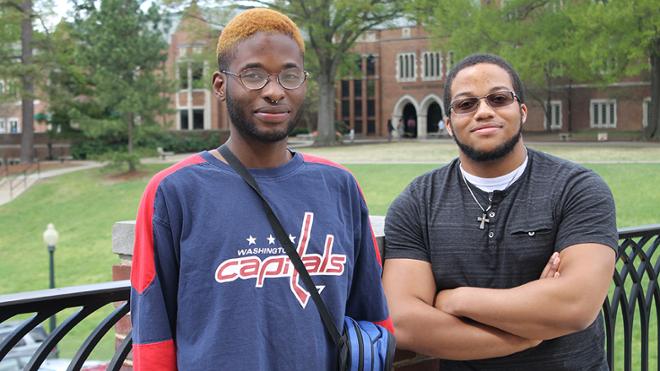Noah Clarke & William Stith, '18
By Breona Walker, CCE Fellow for Student Engagement
During the first semester of their first year, Bonner Scholars visit Bonner Center for Civic Engagement (CCE) community partners in order to ultimately come to a decision on where they would like to serve throughout their time at the University of Richmond.
While there are a wide variety of sites focusing on many issue areas, for Noah Clarke, ’18, and William Stith, ’18, there was one thing that stood out to them both and assured them that a mentoring site was where they needed to be.
"One thing I noticed immediately during rotations [of possible sites] once I joined the Bonner program was there was a huge disparity in not only male mentors but male mentors of color," Stith said.
It was this realization, specifically regarding the underrepresentation of black male role models in after-school programs, which inspired them to apply and begin their Bonner internships with The Youth Life Foundation of Richmond.
The Youth Life Foundation of Richmond operates Learning Centers to develop leaders and makes long-term investments in children from at-risk communities by supporting students academically, developing their character from a young age, raising expectations, and investing in their lives through committed mentoring relationships.
The disproportionate demographics they noticed during their first visits continued to ring true as time progressed. Clarke explained, "There was always something that stood out to me when I was at Youth Life, and it wasn’t the students and how they were behaving, or the dedication of the mentors, but it was that the mentors there were overwhelmingly white."
Clarke and Stith went in with idealized and lofty aspirations of immediately connecting with the youth, but they soon discovered it wasn’t going to be as easy as they thought.
They recall having to get over hurdles with the kids before they could make any kind of impact.
"A lot of the kids have a wall up when you first meet them," Clarke said. "They’re not used to stable, on-going relationships, whether it’s through mentors or family members, so they initially block you out thinking you’re not going to stay around long anyway."
The two went on to break those barriers simply by being vulnerable, authentic, and willing to share their experiences, which, in turn, helped the kids they interacted with feel open to sharing experiences of their own.
"To have someone who looks like them interact with them in a way that’s conducive of learning, it helps them think 'oh, this is something I can actually pursue and achieve in,'" Stith said.
Their four years at Youth Life taught them to appreciate the importance of mentoring and identity – both for the youth as well as for themselves.
"Being myself was something I didn’t know that I could provide to anyone and it’s helpful," Stith said. "Now that I’m aware of that, I think it’s awesome because it puts me in a position to help a lot more people just by being present."
Although their time at Youth Life has come to an end, both Stith and Clarke plan to continue their role as mentors. Stith hopes to start a community garden at Youth Life-Delmont and partner with food justice organizations in the metro Richmond area to expose the youth to the importance of growing and eating healthy food. Clarke is attending Georgetown University this fall and hopes to find a local youth center in Washington, D.C. to volunteer with throughout his time in graduate school.
